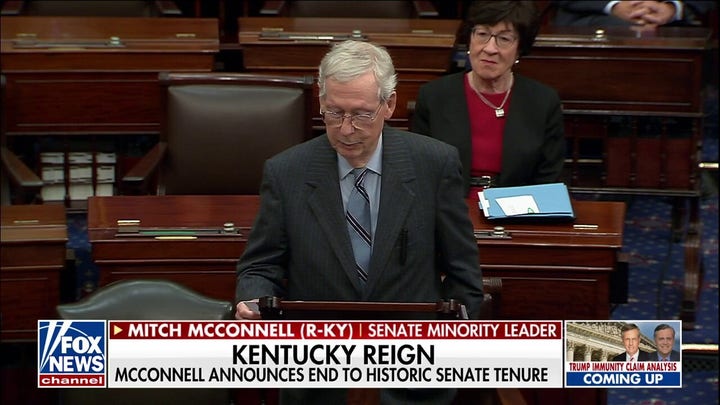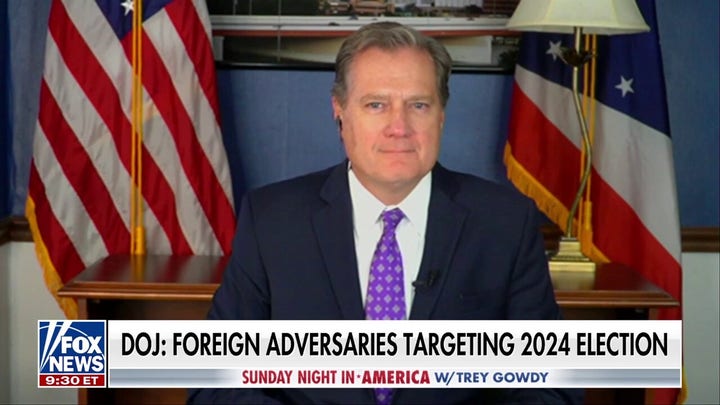Iran’s recent hack of the Trump campaign is an ‘explicit tipping of the scales’ in favor of Vice President Kamala Harris, according to one former national security official.
Last week, the U.S. revealed Iranian hackers had obtained information on the Trump campaign and tried to distribute it to people linked to the Biden campaign and media organizations since June.
‘It’s no surprise, right?’ Robert Greenway, former head of Middle East policy on the National Security Council, told Fox News Digital. ‘Iran perceives the return of Donald Trump and his policies, which brought them to the brink of financial collapse, as an existential threat.’
Trump pulled the U.S. out of the 2015 Iran deal meant to stave off a nuclear Iran in exchange for softening of sanctions. Republicans argued the deal did not have enough enforcement.
After Biden rolled back sanctions on Iran, Greenway argued, the regime went from 500 centrifuges needed to make a nuclear bomb to 7,000. It went from 5% enriched uranium to 60% (90% is needed for a nuclear weapon.) It went from exporting 400,000 barrels of oil per day in 2019 under the Trump administration’s harsh sanctions to 1.7 million barrels per day today.
‘They’ve made a tremendous amount of money. They have had doors opened by the U.S. administration.’
Reports also suggest renewed activity in two nuclear weaponization sites in Iran – Sanjarian and Golab Dareh.
But another Middle East expert shrugged off the incidents, suggesting it could have been as simple as a Trump campaign staffer inadvertently clicking on a phishing scam.
‘The Iranians carry out a bunch of cyberattacks all the time,’ said Aaron Stein, president of the Foreign Policy Research Institute.
‘I think this one might be as explained as simply as somebody was silly enough to click on probably an obvious cyber phishing and it would expose the campaign to potential embarrassment if somebody ultimately chooses to publish the documents.’
‘I don’t know if [the Iranians] have a favorite in the race,’ Stein said. ‘There have been numerous investigations that the Iranians continue to try and actively plot… to take revenge for the killing of [Iranian General] Qassem Soleimani in the Trump administration.’
‘But the Iran nuclear deal is dead. I don’t think anybody is going back to it. I ultimately think the approach to Iran would be more or less the same. Trump might be a little more bellicose, but I think in a practical sense, it’ll be more or less the same.’
‘The Islamic Republic is indeed seeking to sow discord of the West,’ Behnam Ben Taleblu, Iranian expert at the Foundation for Defense of Democracies, said of the campaign hack. ‘But we cannot be ignorant of the empirical record.’
‘The reason the Islamic Republic in 2020 was trying to drive voter turnout on the left, the reason in 2018 and 2019 accounts tied to the Islamic Republic were trying to spoof and amplify methods tied to the progressive left. The reason they tried to hack the Trump campaign very recently, their reason, still the Islamic Republic seeks the assassination of former President Donald Trump, is that Trump was exceptionally successful in his maximum pressure campaign against the Islamic Republic,’ he said.
Iran’s new President Masoud Pezeshkian was in New York City, where he struck a less combative tone at the United Nations General Assembly on Tuesday.
‘We don’t wish to be the cause of instability in the region,’ he told the crowd. ‘We don’t want war… We want to live in peace.’
‘We know more than anyone else that if a larger war were to erupt in the Middle East, it will not benefit anyone throughout the world. It is Israel that seeks to create this wider conflict,’ he insisted.
Pezeshkian was elected on a promise that he could convince the West to lift sanctions on Iran’s nuclear program.
Taleblue predicted that Pezeshkian would take to New York to ‘prime the press to deliver talking points, that they are indeed interested in nuclear talks, but again, really, they’ll only use nuclear talks as a human shield against real pressure.’
‘They will probably try to successfully exploit a permissive environment to sell more oil to China, to generate more revenue to fund its drone program, its missile program and its nuclear program… under patronage from Russia and China.’


